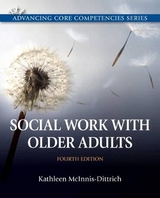
Social Work With Older Adults
Pearson (Verlag)
978-0-205-59360-6 (ISBN)
- Titel erscheint in neuer Auflage
- Artikel merken
The Third Edition of this award-winning text examines the basics of biopsychosocial changes associated with the aging process. Readers are introduced to theories on the biopsychosocial functioning of older adults and are taught how to assess that functioning and plan and implement interventions from a social work perspective. The book includes content on abuse and neglect of older adults, drug and alcohol abuse and the social worker’s role in dying, bereavement, and advance directives.
Ta>
Preface
Chapter One: The Context of Social Work Practice with Older Adults
Aging in the Twenty-First Century
Diversity within the Older Adult Population
The Focus of This Chapter
The Demography of Aging
The Growth of the Older Population
Life Expectancy and Marital Status
Living Arrangements
Poverty
Employment
Health Status and Disability
The Importance of Birth Cohort
Settings for Gerontological Social Work
Geriatric Care Management
Community Social Service Agencies
Home Health Care Agencies
Adult Day Health
Independent and Assisted Living Settings
Hospitals
Nursing Homes
Developing Areas for Direct Practice
Legal Services
Pre-retirement Planning
Macro Settings for Gerontological Social Workers
Personal and Professional Issues in Work with Older Adults
Ageist Personal and Social Attitudes
The Influence of Ageism on Gerontological Social Work as a Career Choice
Ageism and Death Anxiety
Countertransference
The Independence/Dependence Struggle
Self-Awareness and Supervision
Summary
Discussion Questions/Activities
Check Out These Websites!
References
Chapter Two: Biological Changes and the Physical Well-Being of Older Adults
Why Does the Body Age?
Genetic Programming
Cross-Links and Free Radicals
Deterioration of the Immune System
Biological Changes That Accompany Aging
Skin, Hair and Nails
The Neurological System
The Cardiovascular System
The Musculoskeletal System
The Gastrointestinal System
The Respiratory System
The Urinary Track System
The Endocrine and Reproductive Systems
The Sensory System
Implications of Age-Related Biological Changes for Social Work Practice with Older Adults
Older Adults’ Physical Health as a Social Barometer
Private Functions Become Public Business
Environmental Adaptation is Necessary
Incontinence
The Prevalence of Incontinence
Types of Incontinence
Treatment of Urinary Incontinence
HIV/AIDS and Older Adults
Why Older Adults May Be More Vulnerable to Contracting HIV/AIDS
The Biological Vulnerability of Older Adults to HIV/AIDS
HIV/AIDS among Older Adults of Color
Implications for Social Work Practice
What Factors Promote Healthy Aging?
The Influence of Diet
Exercise and Physical Activity
Summary
Discussion Questions/Activities
Check Out These Websites!
References
Chapter Three: Psychosocial Adjustments to Aging
Psychological Changes That Accompany Aging
Intelligence
Personality
Memory
Learning
Older Adults and Sexuality
Social Theories of Aging
Prescriptive Social Theories of Aging
Descriptive Social Theories of Aging
Gender, Race and Ethnicity, Class and the Life Course
“Successful” Psychosocial Aging
Cognitive and Intellectual Functioning
The Significance of Social Support
Implications of Psychosocial Changes for Social Work Practice with Older Adults
Provide Opportunities but Respect Choice
Everything Takes More Time
Psychosocial Health is Often Contingent on Physical Health
Social Isolation Can be Deadly for Older Adults
Change is Always Possible
Summary
Discussion Questions/Activities
Check Out These Websites!
References
Chapter 4: Conducting a Biopsychosocial Assessment
What is an Assessment?
What is the Purpose of a Biopsychosocial Asessment?
Evaluation of Strengths and Obstacles
Identification of Ways to Support and Maintain Existing Functioning
Identification of Interventions That Restore Lost Functioning
Identification of Supports to Replace Lost Functioning
Special Considerations in Assessing Older Adults
The Balance between Independence and Dependence
Origin of the Request for Assessment
The Heterogeneity of the Older Adult Population
Respecting Personal Privacy
Conditions for Conducting an Assessment
The Physical Environment
Optimum Functioning
Explaining the Purpose of the Assessment
The Issue of Confidentiality
Components of a Comprehensive Assessment
Basic Demographic Information
Physical Health
Psychological Functioning
Emotional Well-Being
Sexual Functioning
Social Functioning
Competencies in the Activities of Daily Living
Financial Resources
Environmental Issues
Professional Intuition
Using Collaterals to Gather Additional Information
Example of a Comprehensive Assessment
Summary
Discussion Questions/Activities
Check Out These Websites!
References
Chapter Five: Differential Assessment and Diagnosis of Cognitive and Emotional Problems of Older Adults
Differential Assessment and Diagnosis
Depression in Older Adults
Risk Factors for Depression in Older Adults
The Relationship between Race, Ethnicity, Socioeconomic Class and Depression.
Diagnosing Depression in Older Adults
Dementia
Alzheimer’s Disease
Diagnosing and Assessing Alzheimer’s Disease Using Biopsychosocial Indicators
Vascular Dementia
Delirium
Symptoms of Delirium
Causes of Delirium
Treatment of Delirium
Differentiating between Depression, Dementia and Delirium
Anxiety Disorders
Risk Factors for Anxiety Disorders
Types of Anxiety Disorders
Assessing Anxiety Disorders in Older Adults
Differential Diagnosis of Anxiety
Summary
Discussion Questions/Activities
Check Out These Websites!
References
Chapter Six: Social Work Interventions in the Socioemptional and Cognitive Problems of Older Adults
The Intervention Process
What Happens in the Intervention Process?
Empowerment as a Goal of Intervention
Whose Goals?
Obstacles of Intervention and Treatment in Older Adults
Attitudes about Interventions
Somatization of Emotional Conflicts
Physical Barriers
Cultural Barriers
Developing a Relationship with an Older Adults
Helping Older Adults Understand the Purpose and Process of an Intervention
Developing Rapport
Cognitive-Behavioral Therapy
Older Adults Who Respond Best to Cognitive-Behavioral Therapy
The Process of Cognitive-Behavioral Therapy
Life Review
When Can Life Review be Beneficial?
The Process of Life Review
Validation Therapy
The Principles of Validation Therapy
The Pros and Cons of the Validation Approach
Advantages of the Group Work Approach
The Group Process
Specialized Groups for Older Adults
Reminiscence Groups
The Process of Therapeutic Reminiscence
Remotivation Groups
Social and Recreational Groups
Support Groups
Summary
Discussion Questions/Activities
Check Out These Websites!
References
Chapter Seven: Alternative Interventions in the Socioemotional Problems of Older Adults
Traditional and Alternative Interventions
The Benefits of Creative Arts for Older Adults
The Therapeutic Use of Music
Music as Psychotherapy
Therapeutic Music with Older Adults with Alzheimer’s Disease
Receptive or Passive Use of Music
Active Participation in Making Music
Music Combined with Other Art Forms
Art as a Therapeutic Activity
Art Therapy
Art as a Therapeutic Group Activity
Art as Recreation
Recreation as Therapy
Examples of Recreation as Therapy
Animal-Assisted Therapy
The Human-Animal Bond
Animals’ Roles as Social Connections
Types of Animal-Assisted Therapy
Animal-Assisted Therapy with Older Adults with Alzheimer’s Disease
Precautions in Establishing Animal-Assisted Programs
Summary
Discussion Questions/Activities
Check Out These Websites!
References
Chapter Eight: Substance Abuse and Suicide Prevention in Older Adults
Substance Abuse and Older Adults
Alcohol Use and Abuse by Older Adults
Early-Onset versus Late-Onset Alcoholism
Risk Factors Associated with Alcohol Dependence
Alcohol and Older Women
Psychological and Medical Consequences of Problem Drinking
Recognizing Alcohol Problems in Older Adults
Treatment of Alcohol Problems in Older Adults
Barriers to Treatment
Brief Treatment Approaches
Other Treatment Approaches
Drug Misuse and Dependency
The Use of Illegal Drugs
Drug Dependency and Prescription Medications
The Interaction of Alcohol and Prescription Medications
Treatment for Drug Dependency
Suicide among Older Adults
Risk Factors for Suicide Among Older Adults
Assessing Suicidal Tendencies in Older Adults
The Role of the Social Workers with High-Risk Older Adults
Long-Term Treatment for Suicidal Older Adults
Preventing Suicide among Older Adults
Summary
Discussion Questions/Activities
Check Out These Websites!
References
Chapter Nine: Social Work Practice in Identifying and Preventing Abuse and Neglect of Older Adults
Growing Concern about Abuse and Neglect of Older Adults
The Incidence of Abuse and Neglect of Older Adults
Problems in Identifying the Abuse and Neglect of Older Adults
What Constitutes Abuse or Neglect of Older Adults?
Physical Abuse
Emotional or Psychological Abuse
Financial Exploitation
Neglect
Risk Factors Associated with Abuse or Neglect of Older Adults
Gender and Age
Health Status of Older Adult
Socioeconomic Class
Racial and Ethnic Group Membership
Characteristics of Abusers
Understanding the Causes of Maltreatment of Older Adults
Social Learning Theory
Social Exchange Theory
Psychopathology of the Abuser
Assessment of Abuse, Neglect or Self-Neglect
Reporting Abuse or Neglect
Asessing an Older Adult for Abuse or Neglect
Designing Interventions to Prevent Abuse or Neglect
Protecting against Financial Abuse or Exploitation
Offering Supportive Counseling
Developing Support Services
Modifying the Environment
Abuse and Neglect in Nursing Homes
When an Older Adult Refuses Protective Services
What is the Ethical Dilemma?
Determining Legal Competence
Summary
Discussion Questions/Activities
Check Out These Websites!
References
Chapter Ten: Spirituality and Social Work with Older Adults
Spirituality and Religion in Social Work Practice
Defining Spirituality and Religion
The Social work Profession’s Approach-Avoidance Relationship with Spirituality
Early Ties to Charitable Organizations
The Influences of Empiricism and Freud
Social Work’s Renewed Focus on Spirituality
The Relevance of Spirituality to Social Work with Older Adults
Naming Psychosocial Tasks as Spiritual
The Common Ground between Social Work and Spirituality
Themes and Contexts of Spirituality in Older Adults
The Effect of Religion and Spirituality on Older Adults
Spirituality in the Lives of Older women and Older Adults of Color
Women’s Religiosity and Spirituality
Older Adults of Color
Incorporating Spirituality into Social Work Practice with Older Adults
Precautions before Pursuing Spirituality
Self-Awareness and Spirituality
Learning about Religious Traditions and Practices
Spirituality as an Element in the Assessment Process
Joint Commission on Accreditation of Healthcare Organizations (JCAHO) Assessment Requirements
Spirituality and Social Work Intervention Techniques
How These Efforts Differ from Pastoral Counseling or Spiritual Direction
Summary
Discussion Questions/Activities
Check Out These Websites!
References
Chapter Eleven: End-of-Life Care for Older Adults
End-of-Life Care as Part of Gerontological Social Work
The Process of Dying
The Meaning of Death to Older Adults
Physical and Psychological Manifestations of Dying
The Needs of Dying Older Adults
The Role of the Social Worker in the Dying Process
Providing Emotional Support
Advocating on Behalf of the Older Adult and the Family
Providing Information
Self-Care for the Social Worker
Bereavement and Grief
Manifestations of Grief
Stage Theories of Grief
Factors Affecting the Grieving Process
Complicated Grief
Hospice Care
The Philosophy of Hospice Care
Hospice Care Services
Accessing Support Groups
Advance Directives
Instructional Directives
The Durable Power of Attorney for Health Care
The Social Worker’s Role in Advance Directives
Barriers to Completing an Advance Directive
Ethical Dilemmas in Death and Dying
The Allocation of Scarce Resources to Frail Older Adults
Physician-Assisted Suicide
Summary
Discussion Questions/Activities
Check Out These Websites!
References
Chapter Twelve: Working with Older Adults’ Support Systems: Spouses, Partners, Families and Caregivers
Older Adults; Support Systems
Spouses and Partners
Gay and Lesbian Couples
Changing Marital Roles
The Goals of Supportive Interventions with Older Couples
The Context of Couples’ Work
Helping Older Couples Manage Loss
Creating Opportunities for Mastery and Control
Maintaining Identify
Therapeutic Interventions with Older Couples
Resource Mobilization
Marital Life Review and Reminiscence
Communication Skills Training
The Family Meeting
Planning a Family Meeting
Grandparents Raising Grandchildren
Challenges to Grandparents
Challenges to Grandchildren
Social Work Roles in Supporting Grandfamilies
Caregivers as Support Systems for Older Adults
Gender as a Factor in Caregiving and Care Receiving
Caregiving among Racial and Ethnic Groups
The Stresses of Caregiving
Sources of Stress in Caregiving
Depression among Caregivers
Moderators of Caregiver Stress
Social Work Interventions with Caregivers
Caregiver Support Groups
Improving the Caregiver-Care-Receiver Relationship
Promoting Self-Care for the Caregiver
Summary
Discussion Questions/Activities
Check Out These Websites!
References
Chapter Thirteen: “Aging in Place”: Income Programs, Health Insurance and Support Services for Older Adults
“Aging in Place”
Income Support Programs for Older Adults
Social Security Retirement and Survivors’ Benefits
The Future of Social Security
Supplemental Security Income (SSI)
Health Insurance Programs for Older Adults
Medicare: Parts A, B, and C
Medicare Part D: Prescription Drug Coverage
Medicaid
Support Services to Older Adults
Support Programs Authorized by The Older Americans Act of 1965
Choices for Independence
Finding Services for Older Adults: The Eldercare Locator
Home Equity Conversion Mortgages (Reverse Mortgages)
Accessing the Value of One’s Home
Limitations of the Reverse Mortgage Concept
Continuing Care Retirement Communities (CCRC)
What Challenges Lie Ahead?
Generational Differences
Transportation
Health Care in the Future
Quality vs. Quantity of Life
Discussion Questions/Activities
Check out These Websites!
References
Index
| Erscheint lt. Verlag | 28.11.2008 |
|---|---|
| Sprache | englisch |
| Maße | 235 x 177 mm |
| Gewicht | 544 g |
| Themenwelt | Sozialwissenschaften ► Pädagogik ► Sozialpädagogik |
| Sozialwissenschaften ► Soziologie | |
| ISBN-10 | 0-205-59360-7 / 0205593607 |
| ISBN-13 | 978-0-205-59360-6 / 9780205593606 |
| Zustand | Neuware |
| Haben Sie eine Frage zum Produkt? |
aus dem Bereich



